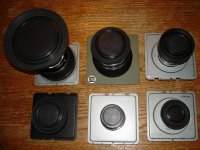dtcls100
Well-known
I always use good quality filters. While all filters degrade image quality of a lens, it is important to stress that the amount of degradation is more theoretical than real, as this degradation is unnoticeable if one uses a clean and good quality filter.
Also, those who don't use filters because of this "degradation" issue overlook the fact that the inevitable accumulation of dust, rain spots, salt spray, sand, airborne grit, greasy haze, pollution, pollen, etc. on an exposed front element and the resulting scratches and necessity of repeatedly cleaning the front element will surely degrade the imaging quality of a lens (and its sale value) FAR MORE than any good quality filter.
I can see the gradual damage that the elements and repeated cleaning inflict on filters and their coatings, even though I always use lens shades and put on lens caps when not using a lens. It is nice to know that I can always replace a damaged filter cheaply, as opposed to having a damaged lens.
Thus logic and commonsense favor using a filter. The resistance of those who refuse to use a filter strikes me as more ideological than practical.
Also, those who don't use filters because of this "degradation" issue overlook the fact that the inevitable accumulation of dust, rain spots, salt spray, sand, airborne grit, greasy haze, pollution, pollen, etc. on an exposed front element and the resulting scratches and necessity of repeatedly cleaning the front element will surely degrade the imaging quality of a lens (and its sale value) FAR MORE than any good quality filter.
I can see the gradual damage that the elements and repeated cleaning inflict on filters and their coatings, even though I always use lens shades and put on lens caps when not using a lens. It is nice to know that I can always replace a damaged filter cheaply, as opposed to having a damaged lens.
Thus logic and commonsense favor using a filter. The resistance of those who refuse to use a filter strikes me as more ideological than practical.




